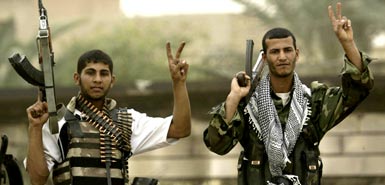HOLD YOUR APPLAUSE
Thomas Friedman points out that, in the exuberance over our liberating Iraq, we are overlooking the plight of ordinary Iraqis who are, in many cases, temporarily without the basic necessities of life.
As I said, I’m certain things will improve with time. But for now, America has broken the old order — Saddam’s regime — but it has yet to put in place a new order, and the vacuum is being filled in way too many places by looters, thugs, chaos, thirst, hunger and insecurity. A particular problem here in the south is the fact that British troops have still not totally secured Basra, the regional center. Without free access to Basra, the whole southern economy is stalled.
It would be idiotic to even ask Iraqis here how they felt about politics. They are in a pre-political, primordial state of nature. For the moment, Saddam has been replaced by Hobbes, not Bush. When I asked Dr. Safaa Khalaf at Umm Qasr Hospital why the reception for U.S. forces had been so muted, he answered: “Many people here have sons who were soldiers. They were forced to join the army. Many people lost their sons. They are angry from the war. Since the war, no water, no food, no electricity. . . . We have not had water for washing or drinking for five days. . . . There is no law, no policeman to arrest people. I don’t see yet the American reign of running the country.”
This is the most basic fact of politics:
Killing Saddam alone will not bring America the thank-yous it expects because Iraqis are not yet feeling free. Only replacing Saddam’s order with a better order will do that. “There is no freedom because there is no security,” said Dr. Mohammed al-Mansuri, the hospital’s director.
This isn’t so much a criticism as a reality check. I’m not sure how we could have simultaneously fought a war and run day-to-day activities in Iraq–I don’t think Friedman is even suggesting that–but it does explain the muted reaction of many Iraqis to their liberation. And why the people in Baghdad, who were liberated at what appears to be the tail-end of the war, are much more exultant than those in Umm Qasr.




